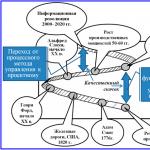My favorite tenor is Mario Lanza, but he left early - they say the Italian mafia was involved in his early death.
Of the tenors of the next generation, Luciano Pavarotti sang well at times, but he was unstable. Jose Carreras was good, but then he got sick and after his illness he began to spare his voice, and this is noticeable. I never liked Placido Domingo - fake and artificial.
Of our tenors, Vladislav Piavko was a very good tenor, but due to the devastation of the 90s, he performed little and left the stage early. Our best Herman in the Queen of Spades is Vladimir Atlantov. Sometimes, in between drinking sessions, Zurab Sotkilava sounded good.
Which tenors of the new young generation are the most famous?
Of the tenors currently singing directly in opera performances on the main opera stages of the world - in Vienna, Milan, Paris, London, New York - this, perhaps, will be the following four:
1. Jonas Kaufmann- tenor from Germany born in 1969. Perhaps the strongest performer of the operas of Richard Wagner, as well as the verist operas of Giacomo Puccini and Pietro Mascagni.
Here he will perform Cavaradossi's aria "The Stars Shined" (E lucevan le stelle) from G. Puccini's opera "Tosca".
2. Rolando Villazon, more often referred to in the world as Villazon, Mexican opera singer with Austrian roots, born in 1972.
Here will be his aria Nemorino “One tear on the sly” ( Una furtiva lagrima) from Gaetano Donizetti's opera "Elixir of Love".
3. Roberto Alagna- French singer of Italian origin born in 1963. The beautiful timbre of tenor voices, alas, does not always last long. Many people move from opera stages to concert activities even before the standard retirement age. So Alanya, while still working in plays, is increasingly gravitating toward concert performances.
Here I present to you his rendition of a famous Spanish song "Piensa en Mí".
4. Juan Diego Flórez Salom, born in 1973 - Peruvian lyric tenor, considered the best performer of bel canto operas - G. Rossini, G. Donizetti.
Count Almaviva's cavatina "Ecco, ridente in cielo" from Gioachinno Rossini's opera "The Barber of Seville" will be performed here.
Well, I’ll mention three more performers who regularly perform on world stages. This: Jose Cura, Argentine tenor; Piotr Beczala from Poland; and from the younger generation - a lyric tenor from Russia Dmitry Korchak, born in 1979.
He will perform Nadir's aria from Georges Bizet's opera The Pearl Fishers.
The recording was taken from a Latvian Russophobe - a farting hedgehog, so I’m not giving a direct link
In his early forties, already called the “voice of the century,” José Cura conquered the stages of Covent Garden, the Sydney Metropolitan, La Scala, Vienna, and Salzburg. Cura is famous for its virtuoso performance of parts in operas by Verdi, Puccini and French composers. He is considered one of the best performers of the verismo genre. Everything he does makes even a heart of stone melt.
The Argentine singer's strong and original interpretations of opera characters brought him worldwide fame. Critics from all continents were delighted with the interpretation of the roles of Othello ("Othello", Verdi) and Samson ("Samson and Delilah", Saint-Saëns). Kura became the first artist in the world to simultaneously sing and conduct an orchestra at concerts. In this unusual capacity, Cura entered the history of opera in February 2003, when, during a performance at the Hamburg Opera, he first conducted Mascagni's La honour rural and then appeared on stage as Canio in Leoncavallo's Pagliacci. An irresistible actor and charismatic performer, Kura takes part in many televised opera performances and concert programs on stages all over the world.
The famous Argentine singer, composer and conductor is the main sex symbol of modern opera. In his youth, he was involved in bodybuilding, received a black belt in kung fu, and now does not miss the opportunity to demonstrate his magnificent physique and athletic skills in the roles of Samson, Jose, Othello, Manrico and other warlike heroes. Critics call him the most attractive performer of a generation, and music lovers note the baritone timbre of his tenor. No wonder he successfully replaced Pavarotti in the role of Radamès in Aida. Cura largely continues the traditions of male bel canto, and the milestones of his career make one involuntarily recall the great voices of the past. So, in 1999, Kura became the second tenor in the history of the Metropolitan Theater to make his debut on its stage on the opening day of the season. His predecessor in 1902 was Enrico Caruso.
It is a rare treat for music lovers to meet a singer whose distinctive voice is forever imprinted in the memory. An artist whose talent, vision and integrity make him stand out even against the backdrop of brilliant partners. An artist whose presence on stage breathes new life into time-worn roles. A conductor who, as a singer and actor, does not present music without its full dramatic meaning. A man whose passion is rivaled only by his knowledge and sense of humanity. This is Jose Cura.
Born in the Argentine town of Rosario on December 5, 1962, José Cura very soon proved his talent. At 12 he played guitar under the direction of Juan di Lorenzo, at 15 he made his debut as a choir conductor, and at 16 he began studying composition and mastering the piano. Having decided to connect his life with opera, Cura went to Italy in 1991, where he studied with Vittorio Terranova, and two years later he made his debut on the European stage in the title role. Amid rising international fame and buzz from critics, 34-year-old Cura makes his debut at Turin's Teatro Regio in Verdi's Othello, conducted by Claudio Abbado. The bold, brilliant interpretation of the role caused a storm of delight in the opera world: London, Washington, Madrid, Trieste, Munich, Buenos Aires, Nice, Paris, Vienna, Zurich, Warsaw, Tokyo, Florence - everyone wants to hear the best Othello in the last quarter of a century.
Cura's voice has the passionate intensity that is so characteristic of tenors such as Pavarotti, Bergonzi and Tagliavini, and the rich vocal nuances are reminiscent of the legendary Caruso. Cura is not inferior to Martinelli in the ease of sounding high notes, and in sonority - to Lauri-Volpi. Fierce, full of strength and at the same time capable of being as soft as if he were sounding for a child, his voice reflects all the nuances and shades of the music. The most important distinguishing feature of Kura's singing is its enormous emotional charge. His singing is a unique human phenomenon, a means of communication, an opportunity for empathy and sympathy. He went beyond the scope of opera singing, conveying to the listener the fullness of emotional experiences. He has rightfully been awarded the title of “tenor of the 21st century.”
This man is multi-talented! The CD of his Argentine songs "Anhelo" states that he not only composed and conducted the entire recording, but also set two poems by Pablo Neruda to music. He succeeded the great Yehudi Menuhin as guest conductor of the Warsaw Symphony Orchestra, runs his own record label and is preparing two albums of his own photographs.
CREATIVE BIOGRAPHY OF JOSE CURA
In 1970, Cura's first music teacher sent him home with a note that read: "Little Jose is not very interested in music, so maybe you can find him another hobby?" In 1978 Kura made his debut as a conductor.
In 1984, Cura won a grant to study singing technique at the Teatro Colon in Buenos Aires, but six months later he left the troupe with the characteristic of “not talented enough.” In 1998, the respected magazine Opera Now wrote: "Singer, composer and conductor, José Cura is one of the most gifted artists of his generation."
In 1999, José Cura sings Radames in Aida. This performance, presented in Verona, became the first opera broadcast on the Internet.
In 2000 Cura sings Alfredo in La Traviata. A stunning production in the authentic scenery of Paris is broadcast live to the whole world.
In 2002 Kura sings in four outdoor venues: Dalhalla, Sweden; Lodz, Poland; Herod Atticus, Greece; and Hyde Park, London, where an audience of 40 thousand people gathered
In 2003, Kura received a storm of applause as the Prophet John in Massenet's rarely performed opera Herodias and returned to the conducting podium, performing with the Warsaw Symphony and Bulgarian Philharmonic Orchestras.
2004 began with a long-awaited tour of the United States, which was a stunning success. Kura is planning symphony concerts in Prague and Budapest with the Hungarian Symphony Orchestra.
The calendar for the current year is impressive: Kura has already sung in “Andrea Chénier” in Vienna, and is going to perform in “Samson and Dalila” in London, “Othello” in Hamburg, “Carmen” in Warsaw and “Stiffelio” in Vienna and Zurich. In addition, the singer is scheduled to make his debut in the role of Dick Johnson in Puccini's opera "The Girl from the West".
An international star, Jose Cura has received many prizes and awards: first prize and public prize at the international singing competition Operalia, 1994; Italian Critics' Abbiati Award, 1997; Orphee d'Or Prize, 1998; title "Best Actor of the Year", Barcelona, 2001; Sochacka Foundation Award, Poland, 2002; Sirmione Catullus Prize noted him as one of the greatest opera performers in 2003.
Official website of the artist.
The great Spanish opera singer José Carreras, thanks to his unique talent, amazing determination and will to live, won the hearts of millions of fans around the world. His hard work allowed him to become famous at a young age - at the age of 28, while other opera performers were just starting their careers during these years. Having achieved incredible heights in the business to which he dedicated his entire life, Carreras does not forget about those who need help and has been involved in charity work for many years.
The youth of Jose Carreras
The future greatest opera singer José Maria Carreras y Coll was born in 1946, on December 5th. His homeland was a working-class suburb of Barcelona. Since Jose became the third child, the family experienced great financial difficulties, and therefore in 1951 they moved to Argentina to find a well-paid job there, however, they quickly returned to Spain. Carreras's father was a zealous soldier during the Spanish Civil War, but he failed to get a decent position, and therefore he became a traffic controller. But my mother ran a small hairdressing salon, which became the first stage for the little singer.
Jose's talent was discovered at the age of 6 - having been deeply imbued with the film "The Great Caruso", in which Mario Lanza played, the boy began to diligently develop his voice, which sometimes drove the whole family into a frenzy. Nevertheless, the parents nevertheless decided to place little Jose in the hands of professional singing teachers, who began to develop the sonorous treble of the young talent. At first he studied piano, and at the age of 8 he entered the Municipal Conservatory of Barcelona. It was at this age that Jose achieved his first dream - on national radio he sang his favorite composition “La Donna E Mobile”. And already at the age of 11, he made his debut on the stage of the Barcelona Grand Opera House, and a little later he was entrusted with several acts in the famous opera production of La bohème.
However, the Carreras family did not properly appreciate the achievements of the young talent, and therefore his father and brother insisted on studying at the Faculty of Chemistry of the University of Barcelona. However, after two years he dropped out of university to devote himself entirely to music. The final decision was made after the death of Carreras’ beloved mother, who always believed in her son and had no doubt that he was destined to become an outstanding tenor. So, Jose began studying at a music lyceum and at the same time studied vocals with private teachers.
Triumph of the young singer
Since 1970, the tenor's creative career has taken off sharply. Thus, Carreras was awarded the seemingly small role of Flavio in the famous opera production “Norma”, which, however, became the singer’s finest hour. From that moment on, the unsurpassed Montserrat Caballe herself took patronage over Jose: he made his real debut in Lucrezia Borgia, in which the opera prima gave him the role of Flavio. In addition, she invited him to the opera “Mary Stuart”, which made him famous throughout the world. It should be noted that their fruitful duet sounded in 15 works.
1971 was marked by the marriage of Carreras. Mercedes Perez became his wife, and already in 1972 they had a son, Albert, and in 1977, a daughter, who was named Julia.
Since 1972, Carreras has successfully made his debut at almost all famous opera houses, such as: in New York with the opera “Madama Butterfly”, with “Rigoletto” at the Vienna Opera, at the London Opera House with the production of “La Traviata”, at the Metropolitan -opera with the play “Tosca” and, finally, at La Scala with “Masquerade Ball”.
The global triumph allowed Carreras to sing with such world celebrities as Placido Domingo, Luciano Pavarotti, Montserrat Caballe, Agnes Balza, Kati Ricciarelli. In addition, the tenor began working with the outstanding conductor Herbert von Karajan, who contributed to his participation in “Carmen”, “Don Carlos”, “Aida”, where he tried himself in a new role, more difficult for his natural vocal abilities.
Since the 80s of the last century, the singer has worked in many musicals (“West Side Story” and “South Pacific” were generally released under his direction), operettas, and gives solo concerts. In addition, Carreras decided in 1987 to remake the film La Bohème, directed by Luigi Comencini.
However, being at the very peak of his career, Carreras learns about his terrible diagnosis - acute leukemia. Doctors gave a very pessimistic prognosis: there was almost no chance of survival. However, thanks to his indefatigable will to live, the tenor managed to get out. After a very long and difficult course of chemotherapy, Carreras took up his favorite work with redoubled zeal, resumed his solo tours, which continued in 1988 and 1989, and sang in a duet with Montserrat Caballe in the French production of Medea. In addition, in 1989, he published his autobiography entitled “Singing from the Heart.”
And in 1990, an outstanding event took place - the “Concert of the Three Tenors” in Rome. The recording of the performance of the star trio - Placido Domingo, Jose Carreras and Luciano Pavarotti - was sold out by more than 13 million fans from all over the world.
Charitable activities of José Carreras
It should be noted that Carreras has not only a unique talent, but also truly human kindness of colossal proportions. So, after his recovery, in gratitude for the chance to live, he became the creator of the “José Carreras Charitable Foundation for the Fight against Leukemia” and the “Spanish Association for Bone Marrow Research.” Carreras gives a third of his fees to these organizations, which also have branches in Switzerland, the USA and Germany.
In addition, Carreras holds the honorary post of UNESCO Goodwill Ambassador and is awarded the Legion of Honor of the French Republic. The European Society of Medicine and Hematology, of which the tenor is also a member, regularly receives assistance from him.
In his homeland, Carreras is very much loved and respected, and they even named theaters in his honor: one is the Auditorium José Carreras, and the other is the Teatro José Carreras.
As I walked to Madame's on Saturday morning, I thought about Kirby and her secrets. Maybe “secret” is not quite the right word, but she clearly did not like to devote outsiders to the details of her personal life.
However, it’s none of my business, right? If I myself am one of those who is ready to tell the first person I meet my biography, this does not mean... Although I’m not entirely right here either. I didn't tell Kirby about how my fiancé was acting like a complete asshole, or about how afraid I was that he would turn out to be a copy of his passive-aggressive mother, or even about the sudden surge of courage that made me turn around and slam the door , apparently, has dried up.
This is understandable - you have to be a complete psychopath to talk about such things with your boss.
Anyway, I was still interested in the mysterious Wednesday events. Maybe Kirby did ballet after all? Imagining a menacing and merciless boss in a tutu, I giggled the rest of the way.
Madame, as usual, met me at the door. She almost tore the shawl from my shoulders in her haste to push me into the small room where the piano stood.
“Brianna, darling, this is simply amazing!” The famous and irresistible Renata Alessandro herself will be your spectator today.
“Delightful” is not the most appropriate word in this situation, in my opinion. Frightened, I looked for Renata, who at that very moment was clumsily lifting all three hundred pounds of her weight from behind the piano.
She looked at me dismissively:
- So this is your student? The best one this season? Now I understand the reason for your upset, Gabriella.
I squeeze my lips tightly to keep myself from responding with rudeness. (Weird - this hasn't been a problem for me before. Maybe I'm slowly learning not to be nice to everyone all the time? Maybe this is the return of door-slamming Super-Brie? Keep it up!)
Madame fluttered into the room:
- No, no, I was never upset about my dear Bree. She is my star, a real nightingale, and in just a few weeks at the audition everyone will know about it.
Renata snorted, looking me up and down:
“If you want my opinion, she looks more like a skinny sparrow.” What kind of resonance can there be with such a bony body?
That's what bothered me the most, so her comment hit the bull's eye. Opera singers need excess weight to enhance their sound and have greater stamina. I couldn't handle two hours of competition with a three-hundred-pound diva. That's why I tried to gain an extra thirty pounds before the audition. Unfortunately, due to numerous stresses (including the upcoming wedding), I not only gained nothing, but also managed to lose a little.
Why is it that you never have a decent piece of chocolate cake on hand when you need it?
– Yes, she could use some weight gain, but she sings fabulously. Darling, for now you sing, and Renata and I will go and have some tea. And then we'll listen to your brilliant performance. Renata promised to express her opinion. That's very kind of her, isn't it?
“Yes, of course,” I muttered, forcing a smile.
Honestly, the last thing I would like is for Madame to show me off to her best student right now. The only one who was accepted into the Metropolitan Opera on the first try. The only student allowed to address Madame by her first name.
“The only one comparable in size to a small state,” my touchy inner voice muttered.
“Yes, and this little country will wipe you out with its singing, so stop sulking and listen to what she has to say. If you’re lucky, Renata will be seized with such a strong desire to show her superiority that her advice may actually be useful.”
The air was still vibrating with the final notes of the passage I had performed, and I slowly opened my eyes and smiled. I knew I had “knocked Puccini out of the park,” as Jamie would say.
"Why do I think about Jamie?"
She crossed her arms and waited, trying to appear meek and ready to accept any advice with gratitude. This, however, was not an easy task, because I always know whether I sang well or badly, and this time my singing was truly excellent.
“I’ll make a splash at the audition!”
“You will fail the audition,” Renata declared.
My face fell.
- What... what did you say?
I noticed that Madame had her mouth open in surprise, and I calmed down a little.
Renata picked up her bulk from the sofa and shook her head:
-You sang terribly. If this is the best you can... And there is so little time before the audition... So there is nothing to hope for.
I couldn't believe my ears. Did a bear step on her ear? Or to me? How could I be so wrong about my abilities?
– But, Renata, I worked these passages flawlessly. I have never sung Puccini better than today. What are you... how can you...
She snorted:
– If this is the best you can demonstrate, then immediately stop singing altogether. Believe me, I'm saying this for your own good. You will never rise above a second-string chorus girl in a provincial theater. You have a shrill voice, and you sing rather inexpressively. – Each word, piercing my heart with an arrow, left another destroyed dream in its path.
Renata proudly raised her head and looked at me with a nasty, malicious smile:
-You have no chance. Better refuse right away.
Madame finally found the gift of speech, and what a gift!
– You... you... stupid! How can you talk about my dear Brianna like that? Her singing was beautiful. She sang Puccini with such feeling that she could have moved a statue to tears. Of course, you have achieved something in life, Renata, but in your soul you have remained the sad, envious girl whom I taught for a long time. “She jumped up and rushed to hug me: “Don’t pay attention to her, dear.” I hoped that success would cure her of self-doubt, but it seems I was wrong. Go away, Renata, and pray that your spiteful tirade does not shake the morale of my new favorite student.
Renata narrowed her eyes, looking at me and Madame with an angry glance, and jumped out of the room, but turned around at the door:
“Fine, I’ll leave, but know this: if my honest assessment can destroy what little confidence she may have, then she doesn’t belong in the front row.” In our profession, only the strong survive; and if the sparrow thought differently, then I am very sorry for him.
I finally found my voice too.
“If you think that being an evil... witch... is the only way to prove your strength, then I feel very sorry for you.
Renata opened her mouth to answer, but her face suddenly took on a strange, almost sad expression. She just let out an irritated sniffle and left, slamming the door.
I exhaled and trembled, a slow reaction to what had happened. I just insulted someone who may very well influence my future career for years to come. She opposed a woman known for her penchant for intrigue and gossip.
“I knew what the stakes were and I didn’t back down. It would be good to remember this the next time you have lunch with Lyle and Eleanor.” For a couple of minutes I was proud of myself. Then she began to fear that Renata was right.





